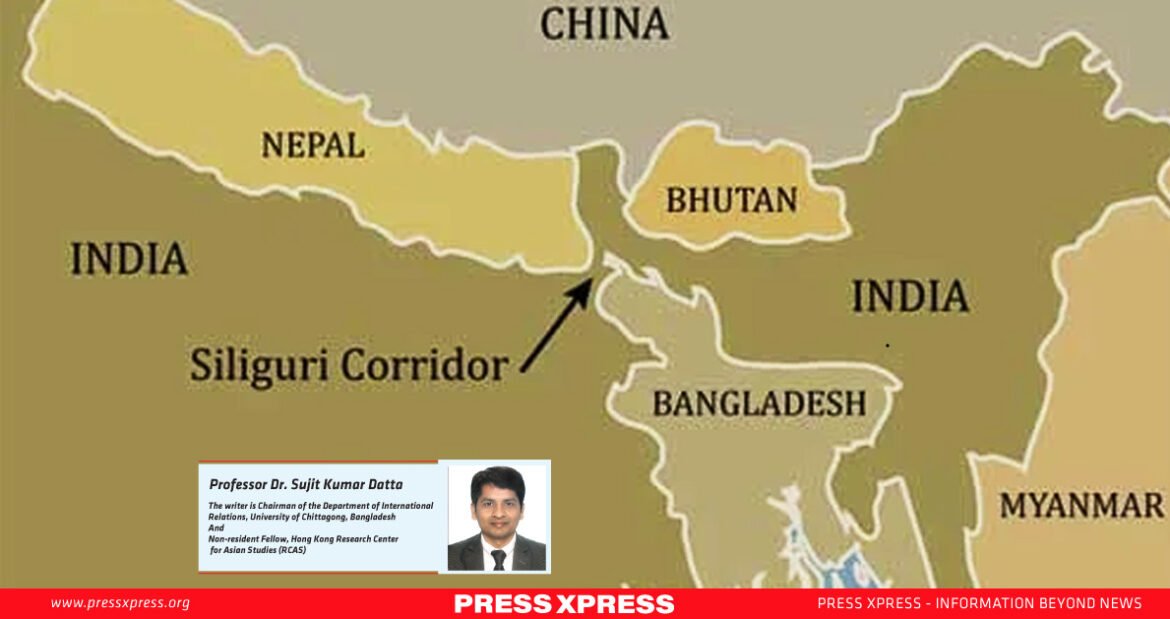The Siliguri Corridor, also known as the ‘Chicken Neck’, provides mainland connectivity to the northeastern states of India. This narrow corridor in West Bengal’s Darjeeling district is vital for India, as it connects Southeast Asia, East Asia, and other parts of South Asia, including Myanmar. The strategic and military importance of the Siliguri Corridor is immense. The Siliguri Corridor is considered an important gateway to the Indo-Pacific region and will connect to the ASEAN Highway network by connecting with India’s ‘Golden Quadrilateral’ highway network. Due to the military importance of the Siliguri Corridor, India has established two airports in the area—one at Bagdogra and the other at Hasimara. These airports provide additional security at the eastern and western ends of the corridor.
You Can Also Read: Bangladesh’s Diplomatic Chessboard: The Significance of Hasina’s Upcoming Visit to China
The Indian Army maintains a heavy military presence in the region, ready to counter any threat from China. This corridor is constantly under surveillance due to border conflict with China. The strategic location of the Siliguri Corridor plays an essential role in the politics of major powers like India, China, and the United States. This narrow corridor of West Bengal connects the mainland with the northeastern states of India, which is essential both militarily and commercially. China has already exerted diplomatic pressure in the region and expressed interest in the Teesta project, a concern for India. The US is also preoccupied with countering China’s rising power, and the Siliguri Corridor’s strategic importance is increasing in this geopolitical context.
Bangladesh and Siliguri Corridor
The strategic location of the Siliguri Corridor is also significant for Bangladesh. This corridor can directly connect Bangladesh, Nepal, and Bhutan, increasing Bangladesh’s commercial and economic development. The connectivity of the Siliguri Corridor will facilitate Bangladesh’s export and import activities and strengthen trade relations with other South Asian countries. Moreover, establishing road and rail links with Nepal and Bhutan will boost Bangladesh’s strategic position. Trilateral trade will likely increase through this corridor, bringing economic prosperity to the entire region.

Geopolitical Pressures and Chinese Activities
Due to the strategic importance of the Siliguri corridor, China has initiated diplomatic activities in the region. China has already exerted diplomatic pressure on India’s neighboring countries, a significant concern for India. China still claims India’s Arunachal Pradesh as its territory and strongly protested Indian Prime Minister Narendra Modi’s visit to the region last March. China claims that the region belongs to China and not to India. But, India reaffirmed its sovereignty over Arunachal Pradesh, dismissing China’s claims and asserting that the state has always been and will remain an integral part of the country.
USA and China
The growing tension between India, China, and the US over the strategic location of the Siliguri Corridor is evident. China’s rising power and efforts to expand its influence in South Asia cause concern for the United States. The Siliguri Corridor connects India’s northeastern region with the mainland and is essential in deterring Chinese military aggression. China still claims India’s Arunachal Pradesh as its part and tries to pressure India through border conflicts. On the other hand, the US is willing to counter China’s rise and support India. The importance of the Siliguri Corridor has increased amid these geopolitical pressures, as it has become essential to India’s military and commercial interests.
The strategic importance of the Siliguri Corridor is crucial for India, China, the USA, and Bangladesh. This corridor is an important military and trade route for India and a strategic gateway to South Asia and the Indo-Pacific region. Therefore, monitoring the political and military activities of various countries in the region is very important. The Siliguri Corridor’s strategic location provides an opportunity to establish an essential link for Bangladesh, Nepal, and Bhutan.
However, due to the geopolitical activities of China, India, and the US in the region, Bangladesh has to be cautious when making strategic decisions. The Siliguri Corridor is not only a communication channel but also a strategic gateway that is important for regional stability and economic development. We should remember that the Bangladesh-India relationship is a special and unique paradigm that has developed mainly politically and historically.
In the liberation war of Bangladesh in 1971, the Indian people supported our freedom struggle with their blood, which is an integral part of the friendship between the two countries. On the other hand, Bangladesh-China relations are mainly based on economic cooperation. China, one of Bangladesh’s largest trading partners, has made significant contributions to Bangladesh’s infrastructure and industrial sectors by investing in and financing various development projects. This economic relationship is significant for the mutual prosperity and development of the two countries.


